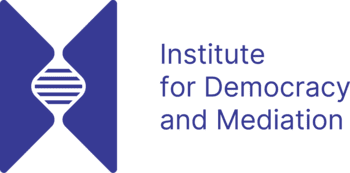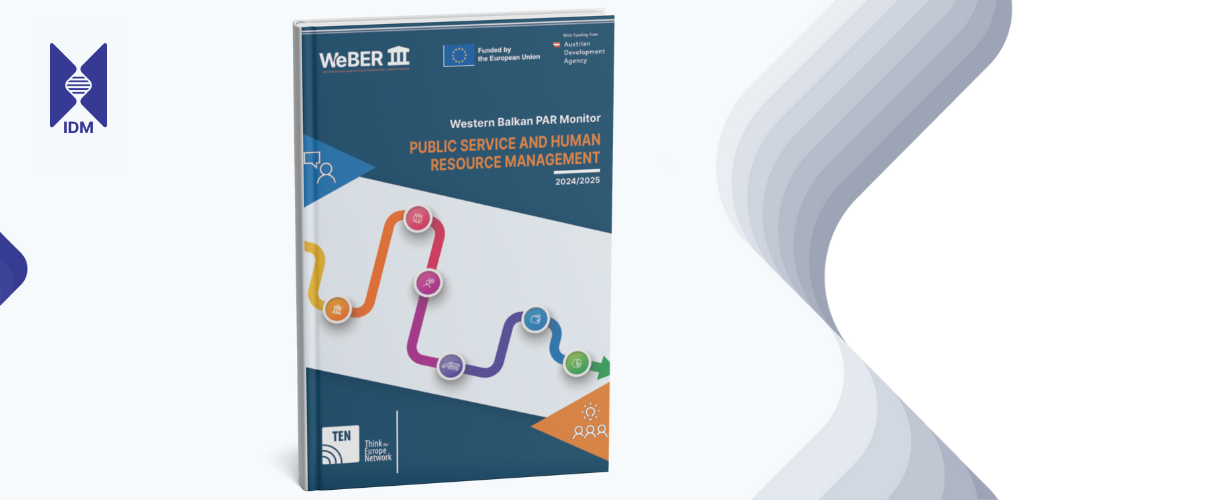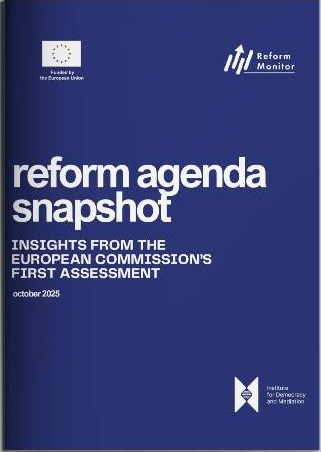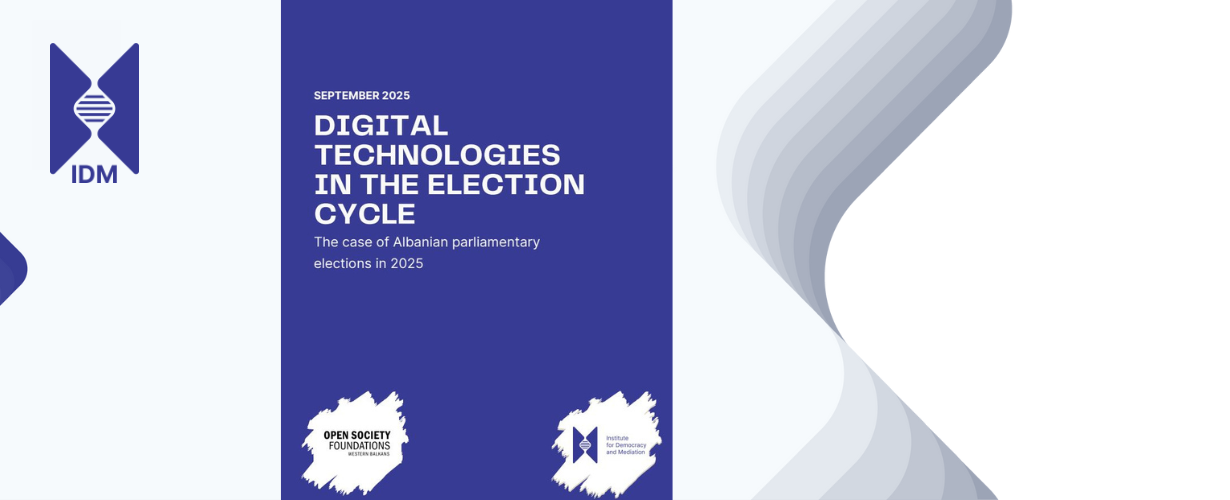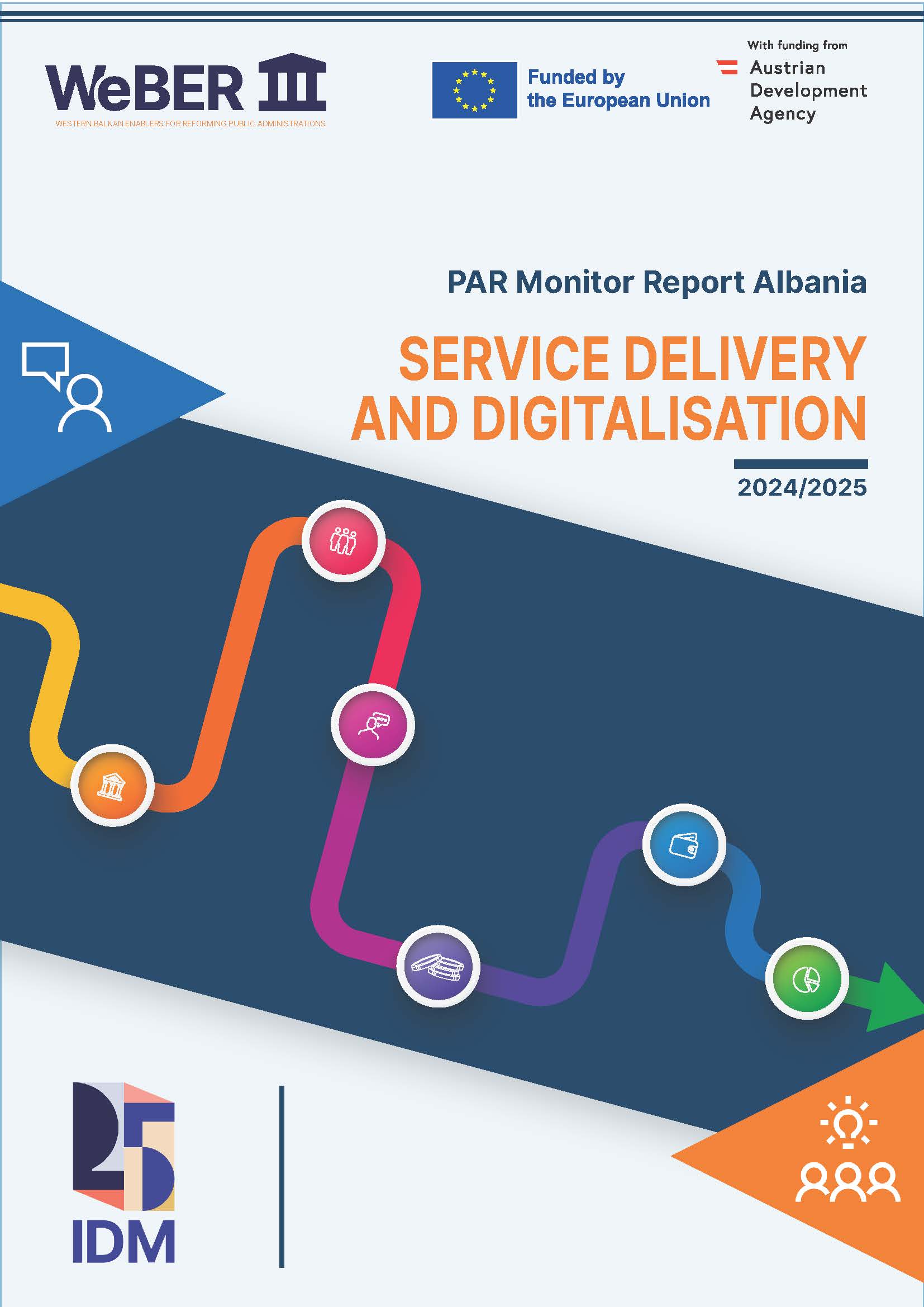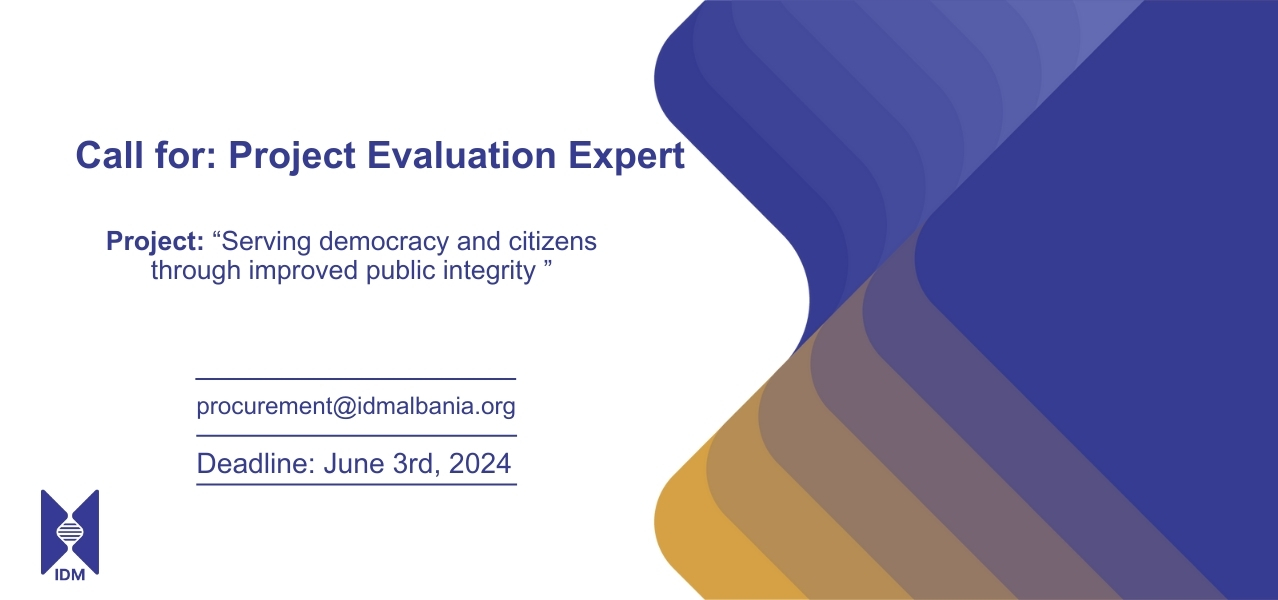TERMS OF REFERENCE FOR PROJECT EVALUATION EXPERT
Project “Serving democracy and citizens through improved public integrity – SIDA”
I. Background Information
Institute for Democracy and Mediation (IDM) is currently implemented the project “Serving the democracy and citizens through improved public integrity” since December 2021. The project aims to strengthen institutional integrity management systems, public trust, accountability and increase citizens’ engagement on fighting against corruption and threats to integrity. The ultimate goal is to regain citizens’ trust as a cornerstone and key ally of institutions in their efforts to deliver integrity governance Parliament of Albania, High Prosecutorial Council – HPC, Constitutional Court, IDP Commissioner, Ministry of Health and Social Protection, the Institute for Public Health and the newly established General Directorate of Anticorruption (GDA) at the Ministry of Justice (MoJ) are the main target institutions and direct beneficiaries of the project. During this implemented period the IDM project team worked intensively for the correct implementation of the planned interventions and activities such as: the identification and assessment of institutional risks in the targeted institutions, the preparation of integrity plans and Code of Ethics in the institutions targeted, the development of two trainings for the most official trainers of the GDA and other target institutions of the project. The work continued for the experimental design for testing integrity and anticorruption paradigms/ premises through innovative applied research as well as designing the instrument of civic monitoring for the implementation of the integrity plans in corporation with Transparency International.
Overall goal:
The project involves the following theory of change: through Institutional resource developed for continuous capacity development in IRA methodology and integrity plans drafted and implemented at institutional level; CSOs are able to generate evidence-based findings in monitoring local plans and knowledge is produced for integrity & anticorruption, the project will contribute toward achieving the desired change – to increased institutional integrity, consequently citizens trust and engage with institutions in anticorruption & integrity building measures.
Specific objectives:
· Institutional capacities in target institutions are built for the development and adoption of integrity plans.
· Capacities of civil players are built to improve implementation of institutional integrity plans through monitoring and evidence-based feedback.
IDM is striving to achieve such goals through monitoring, research studies, and policy recommendations that aspire to improve the public institutions’ performance. IDM partners and supporters in the area of good governance, anticorruption and integrity building include prominent independent organizations such as UN agencies, European Commission, Transparency International etc.
Target groups and beneficiaries:
Target institutions including Parliament of Albania, High Prosecutorial Council – HPC, Constitutional Court, IDP Commissioner, one Line ministry and one dependent agency (the last two to be confirmed during the inception phase of the project), and the newly established General Directorate of Anticorruption (GDA) at the Ministry of Justice (MoJ) are the main target institutions and direct beneficiaries of the project. They will increase their institutional technical capacities and will improve their organizational resilience to integrity violation as well as public trust and accountability. GDA at MoJ will increase its technical capacities to effectively play its role in coordinating anticorruption and integrity building efforts. The Albanian School of Public Administration (ASPA) is another important institution that will benefit from the project and at the same time will contribute to sustainability of project outcomes, particularly those related to capacity development in public integrity and integrity management.
Senior and mid-level public officials and administration in five target institutions are the main beneficiaries and direct target groups of the project, as they will be involved throughout the integrity planning process at institution level. Five Integrity Working Groups, one in each of the five target institutions, will be established and trained to lead integrity planning in their institutions pursuing a participatory approach making sure that staff engaged in different levels are included in the process. The working group at the Constitutional Court will focus on a different process, that of the development of the Code of Ethics.
GDA officials and staff, anticorruption focal points in central government agencies as well as ASPA management and technical staff and are also beneficiaries and direct target groups of the project. The project will offer capacity development on IRA and integrity plans’ monitoring and reporting. The enhanced capacities are expected to positively contribute to the implementation of the Inter-sectoral Strategy against Corruption.
The Department of Public Administration, whose role is to ensure a stable, professional civil service based on merit, moral integrity, and political impartiality is one of the beneficiaries.
The Albanian School of Public Administration (ASPA) is another important institution that will benefit from the project and at the same time will contribute to the sustainability of project outcomes, particularly those related to training public employees on public ethics and integrity modules.
Apart ASPA management and technical staff, public officials and staff, in central government agencies, local government units, and public officials in independent institutions are also beneficiaries’ groups of the project. The project will offer capacity development on the implementation of ethics and integrity-related legislation.
Human resource units in the line (central government) ministries (11 ministries: Ministry of Justice, Ministry of Education and Sport, Ministry of Health and Social Protection, Ministry of Culture, Ministry of Tourism and Environment, Ministry for Europe and Foreign Affairs, Ministry of Finance and Economy, Ministry of Infrastructure and Energy, Ministry of Agriculture, Ministry of Interior and Ministry of Defence) responsible
for the counselling, informing and training process of the public employees on ethical rules in public institutions.
Senior and mid-level public officials and the staff in ALSAI will build their knowledge and capacities on the integrity process and support their actions in monitoring integrity plans. Non-state and independent stakeholders including civil society, researchers and think tankers, media reporters are among main beneficiaries and direct target groups of the proposed action. The project will build their knowledge and capacities on the integrity process and support their actions in monitoring integrity plans making use of CiMoF. Additionally, the project will develop capacities of young researchers through tailored trainings to upgrade their research capacities and skills on integrity and anticorruption.
Albanian citizens/individuals are among the indirect beneficiaries of the project, specifically under the Integrity & Anticorruption knowledge hub component. Ordinary citizens are the target of social experimenting tools aiming at testing integrity & anti-corruption paradigms. A maximum of 220 individuals will be the target of this component.
The final beneficiaries of the project consist of the entire Albanian population in general as they will benefit from improved governance and effective public service fully responsive to their needs and priorities.
II. Evaluation purpose, objectives and use
In this context, IDM is seeking to engage a national expert to assess the achievement of project results and performance of the first year of implementation of the above-described intervention considering the following evaluation criteria: relevance, effectiveness, impact, organizational efficiency and sustainability. Specifically, the objectives of this evaluation are to:
· Assess the effectiveness and potential measurable impact of the project intervention;
· Assess organizational efficiency in progressing towards the achievement of project results as defined in the intervention;
· Assess the sustainability of the results and intervention in the empowerment of the project beneficiaries;
· Identify and document lessons learned, good practices and innovations, success stories and challenges within the project;
· Identify strategies for replication and up-scaling of the project’s best practices;
· Provide actionable recommendations for future project development and maximize ownership by partners in the areas covered by the project;
The findings of the evaluation are expected to contribute to effective programming, organizational learning and accountability.
III. Evaluation scope, methodology and questions
3.1. Scope of the evaluation
An evaluation to assess the results achieved by the Project throughout its entire implementation period is scheduled to be conducted by September 2024.
3.2 Evaluation methodology
The evaluation will be a transparent and participatory process involving relevant stakeholders and partners. The evaluation will be based on gender and human rights principles and adhere to the IDM Code of Conduct guidelines.
The evaluation methodology will follow a Theory of Change approach and employ mixed methods including quantitative and qualitative data collection methods and analytical approaches.
Methods may include but are not limited to:
· Desk review of relevant documents such as project documents, progress reports, financial records, meeting minutes and monitoring reports, and secondary data or studies relating to the regional and country context;
· Semi-structured interviews focus group discussions, surveys with direct and indirect beneficiaries, implementing partners, donor and other key stakeholders;
· Interviews with key stakeholders to ensure further triangulation.
It is expected that the service provider for this evaluation, will further refine the approach and methodology and submit a detailed description in the inception report. The methodology and approach must, however, incorporate human rights and gender equality perspectives.
3.3. Evaluation questions
Relevance
· To what extent does the project address the main needs of the project´s target groups?
· To what extent have gender and human rights principles and strategies been integrated into the project design and implementation?
Coherence:
· To what extent the project is complementarity, harmonization and coordination with the interventions of other actors’ interventions in the same context?
Effectiveness
· To what extent have the expected results of the project been achieved on both objectives and results levels?
· Has the project achieved any unforeseen results, either positive or negative? For whom? What are the good practices and the obstacles or shortcomings encountered? How were they overcome?
· How well did the intervention succeed in involving and building the capacities of
the project beneficiaries?
Impact
· What evidence exists that the project has delivered mid to longer-term results?
Efficiency
· Have resources (financial, human, technical support, etc.) been allocated strategically to achieve the project outcomes?
· Has there been effective leadership and management of the project including the structuring of management and administration roles to maximize results?
Sustainability
· To what extent the project fostered the participation of relevant CSOs and other interest groups?
· To what extend the project results will be sustained in the future?
· What factors are/will be critical to maintain project results in the long term?
The above-outlined evaluation questions are tentative, and the evaluation expert is expected to refine those in the context of the project implementation of the evaluation.
IV. Deliverables
The consultant will submit the following deliverables:
1. An inception/methodology report.
2. A draft report including a draft executive summary
3. The final report with the final executive summary
V. Timeline
The assignment shall be completed by the end of September 2024. It is expected that the expert will work a total of 27.5 working days from early June.
VI. CORE COMPETENCIES
Academic Qualifications:
· Postgraduate degree in social sciences, management and other related areas;
Experience:
· Demonstrated expertise in project evaluation and civil society sector in Albania.
· At least 7 years of technical background in good governance, public administration, and/or local development issues;
· At least 5 years of proven experience in evaluating programmes/projects;
· Experience and expertise in project design, management, monitoring, and evaluation;
VII. Application Process
Interested candidates are invited to submit the following documents:
· Curriculum Vitae
· Financial Offer.
· A technical offer (max. 5 pages) comprising:
· Proven understanding of the objective of the assignment and the Terms of Reference (ToR);
· Brief description of the methodology and tools proposed;
· A chronogram showing details for the realization of each of the assignment phases.
· At least one previous evaluation report
All applications must be submitted electronically to [email protected], in English no later than 03.06.2024.
Find below the required documents:
[Download not found] [Download not found] [Download not found][Download not found]
